

Rhizomatic Education : Community as Curriculum. Below is my paper as it appears in Innovate – Journal of Online Education.
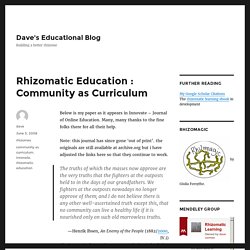
How to Make the Most of the Flipped Classroom. Teaching and Learning | Feature How to Make the Most of the Flipped Classroom Last semester, the Vanderbilt University (TN) Center for Teaching's two most popular workshops were "Flipping the Classroom" and "Leading Classroom Discussion.
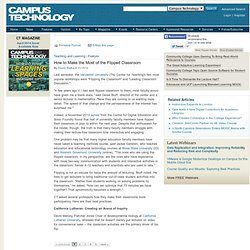
" "A few years ago if I had said flipped classroom to them, most faculty would have given me a blank stare," said Derek Bruff, director of the center and a senior lecturer in mathematics. "Now they are coming to us wanting more detail. Feminist professors create an alternative to MOOCs. At first glance, "Feminism and Technology" sounds like another massive open online open course.
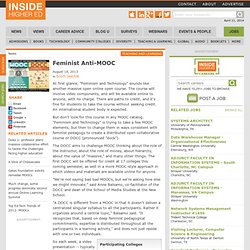
The course will involve video components, and will be available online to anyone, with no charge. There are paths to credit, and it's fine for students to take the course without seeking credit. An international student body is expected. MOOC, SPOC, DOCC, Massive Online Face2Face Open . . . (Uh Oh!): Age of the Acronym. On Facebook, my pal John recently joked that we're not living in the Digital Age.
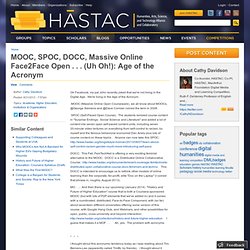
We're living in the Age of the Acronym: MOOC (Massive Online Open Courseware), we all know about MOOCs. @George Siemens and @Dave Cormier coined the term in 2008. SPOC (Self-Paced Open Course). The students remixed course content in "Surprise Endings: Social Science and Literature" and added a lot of content into seven open self-paced content units, including seven 20-minute video lectures on everything from self-control to racism, by myself and the famous behavioral economist Dan Ariely plus lots of course content on these topics . DOCC: This Fall, FemTechNet is offering a very exciting feminist alternative to the MOOC. I thought about this acronymic tendency today as I was reading about Tim Berners-Lee (apparently called TimBL by friends).
There have been so many predecessors to today's MOOCs. In fact, HASTAC has been pioneering alternative forms of open teaching and learning since 2002. f3c465_20d64b39f124c8461cebf62e4703ab36. Before and After MOOCs. My Open Learning: cMOOCs. Current 1) Open Online Experience 2013Overview: This year-long professional development course is open to anyone, and focuses on education technology for K- 16.
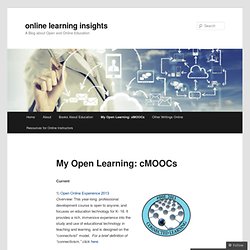
It provides a rich, immersive experience into the study and use of educational technology in teaching and learning, and is designed on the “connectivist” model. For a brief definition of “connectivism,” click here. To view #OOE 2013′s Google + community learning page click here. Courses Logo for etmooc from etmooc.org 1) Edtech MOOC 2013, Alec Couros Course Duration: January 13 to March 30, 2013 Participation Level: see below. New Models of Online Education: Disrupting the User Experience for the Better. New Models of Online Education: Disrupting the User Experience for the Better MOOCs have not yet disrupted the higher education space in any significant way, but they could have a massive impact on the importance of providing students with a better learning experience at institutions, whether online or on-campus.
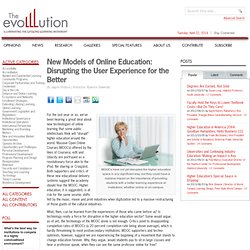
For the last year or so, we’ve been hearing a great deal about new technologies of online learning that some public intellectuals think will “disrupt” higher education around the world. Massive Open Online Courses (MOOCs) offered by the likes of Coursera, edX and Udacity are portrayed as a revolutionary force akin to the iPod, file sharing or Craigslist. Both supporters and critics of these new educational delivery systems suggest the academy should fear the MOOC. To Degree, Or Not to Degree? To Degree, Or Not to Degree?
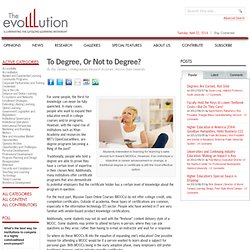
Students interested in learning for learning’s sake should turn toward MOOCs. However, if an individual’s objective is career advancement or change, a traditional degree or certificate is still the most effective option. For some people, the thirst for knowledge can never be fully quenched. In many cases, people who want to expand their education enroll in college courses and/or programs.
However, with the rapid rise of institutions such as Khan Academy and resources like MIT’s OpenCourseWare, are degree programs becoming a thing of the past? Traditionally, people who hold a degree are able to prove they have a certain level of expertise in their chosen field. For the most part, Massive Open Online Courses (MOOCs) do not offer college credit, only completion certificates.
Justifying the Cost of Higher Education: Why I Took a MOOC. Justifying the Cost of Higher Education: Why I Took a MOOC MOOCs allow students the opportunity to learn the material they need to advance their careers without forcing them to conform to the mold of a given institution.
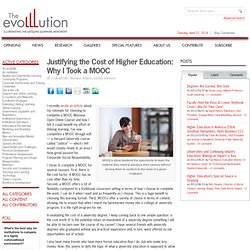
I recently wrote an article about my rationale for choosing to complete a MOOC (Massive Open Online Course) and how I felt it could benefit my effort of lifelong learning. I’ve now completed a MOOC through edX — a Harvard University course called “Justice” — which I felt would closely relate to an area I have great passion for, Corporate Social Responsibility. Degree Completion Not Keeping Pace with Workforce Needs. Degree Completion Not Keeping Pace with Workforce Needs Degree completion among working-age American adults is not keeping pace with the needs of the labor market, according to a report released by the Georgetown University Center on Education and the Workforce.
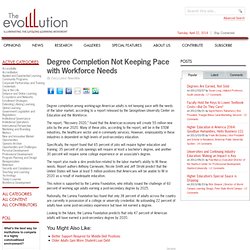
The report, “Recovery 2020,” found that the American economy will create 55 million new jobs by the year 2020. Many of these jobs, according to the report, will be in the STEM industries, the healthcare sector and in community services. However, employability in these industries is dependent on high levels of post-secondary education. Specifically, the report found that 65 percent of jobs will require higher education and training; 35 percent of job openings will require at least a bachelor’s degree, and another 30 percent will require some college experience or an associate’s degree.